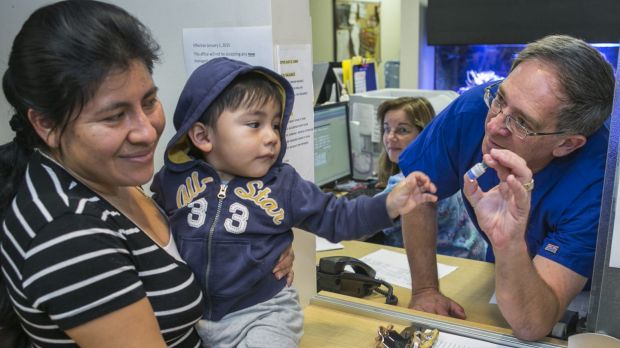
Pediatrician Charles Goodman, talks with patient Carmen Lopez, 37, holding her 18-month-old son, Daniel after being vaccinated with the measles-mumps-rubella vaccine in Northridge, California. Photo: Damian Dovarganes
New York: The measles outbreak tied to Disneyland in Anaheim, California, continued to spread anxiety on Friday as two new cases emerged overnight in Marin County in California – along with at least one in Nebraska – while Arizona officials warned that at least 1000 people may have been exposed to the virus through seven others in that state.
Since January 1, the federal Centres for Disease Control and Prevention have confirmed 84 measles cases in 14 states. California’s health department, which is updating a measles count more frequently, has linked more than 90 cases in the United States and Mexico to the Disneyland outbreak.
The White House on Friday urged parents to heed the advice of public health officials and scientists in getting their children vaccinated.
“People should evaluate this for themselves with a bias toward good science and toward the advice of our public health professionals,” President Barack Obama’s spokesman Josh Earnest told reporters.
Asked whether people should be getting vaccinated, Mr Earnest said: “That’s what the science indicates.”
“The science on this is really clear,” Mr Earnest added.
The measles outbreak has renewed a debate over the so-called anti-vaccination movement in which fears about potential side effects of vaccines, fuelled by now-debunked research suggesting a link to autism, have led a small minority of parents to refuse to allow their children to be inoculated.
Some parents also opt not to have their children vaccinated for religious or other reasons. Scientists defend the safety of vaccines.
Concern about the highly contagious disease intensified on Friday in several states, including Minnesota, where health officials are notifying hundreds of people who may have come into contact with a University of Minnesota student with measles.
There was also anxiety in Arizona, where thousands of people are arriving in Phoenix for the Super Bowl on Sunday. The disease centres are now advising anyone with symptoms not to attend the game.
“The very large outbreaks we’ve seen around the world often started with a small number of cases,” said Dr Anne Schuchat, director of the agency’s National Centre for Immunisation and Respiratory Diseases.
Officials in three counties in the Phoenix area – Maricopa, Gila and Pinal – have already asked residents who have not been vaccinated and who might have been exposed to stay home from school, work or daycare for 21 days. Schools in some other states are considering more formal bans on unvaccinated children.
“This is a critical point in this outbreak,” the Arizona state health director, Will Humble, wrote on his blog. Any missed cases, he wrote, could cause “a long and protracted outbreak”.
Symptoms of measles include rash and fever, and the airborne virus can spread swiftly among unvaccinated people.
Most people recover within a few weeks, although it can be fatal in some cases. It can cause serious complications such as blindness and pneumonia in those who are malnourished or have weaker immune systems.
Each case so far has spawned an exhaustive public health response.
News sites in Pennsylvania and other states are alerting readers when measles-infected individuals have visited local establishments, an effort to warn residents of exposure. And in places like New Mexico, where the number of unvaccinated children increased 17 per cent from 2012 to 2014, health officials are warning that the disease could soon hit.
In Minneapolis, the Minnesota Department of Health said on Friday that it is working with the University of Minnesota to manage the case of measles diagnosed in a 20-year-old male university student. It has notified other students who may have been exposed, along with health officials at the hospital where he sought treatment.
“We are going to be watching this situation very closely,” the Minnesota commissioner of health, Dr Edward Ehlinger, said.
Dr Ehlinger emphasised that the potential risk to the general public is very low, but said people should take precautions to protect themselves and their children. In particular, he called on parents to make sure their children have been properly immunised.
Public health officials from across the nation have made appeals in recent days to have their children immunised, and there are signs that the trend away from vaccination may be reversing in at least some locations.
In Maricopa County, Arizona, three clinics have experienced a surge in visitors requesting measles vaccinations for their children, according to health officials, who reported a 50 per cent rise in vaccination requests over last year.
New York Times, Reuters
